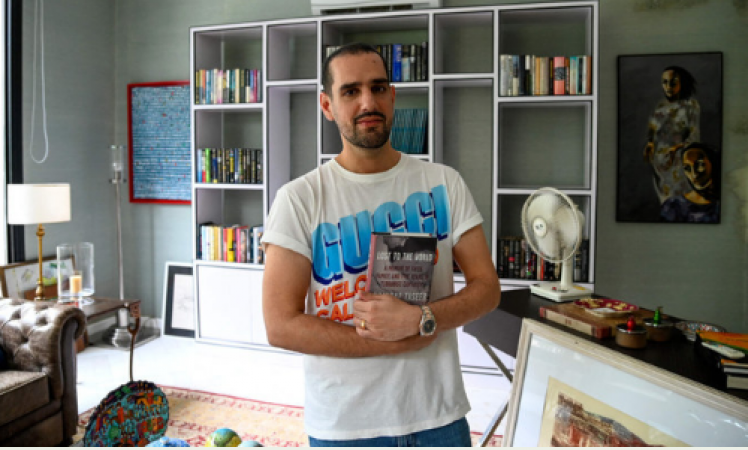
Lahore: Shahbaz Taseer claims that after being tortured and imprisoned by jihadists for almost five years, he lost all memory of what it was like to smile. He is now determined to live fearlessly.
His abduction in August 2011 was one of the most well-known in Pakistan because he was the scion of a well-known business and political family. I remember how alien that feeling was — of smiling," Taseer, 39, said in an interview with AFP. "I went a very long time without laughing."
Following the withdrawal of foreign troops and the Taliban's return to power in Kabul two years ago, violence and extortion were on the rise along Pakistan's border with Afghanistan when his book "Lost to the World" was published last November.
Months after his father Salmaan, who was the governor of Punjab province at the time, was fatally shot by a bodyguard for advocating changes to the nation's strict blasphemy laws, Taseer was kidnapped close to his home in Lahore.
The governor and his family were targeted by Islamist extremists because Salmaan had defended Asia Bibi, a Christian woman accused of blasphemy whose case received widespread media attention.
Taseer was kidnapped by the Islamic Movement of Uzbekistan (IMU), a group that has been held accountable for a number of high-profile attacks in Pakistan, including the 2014 airport storming that left dozens dead.
Taseer was smuggled through roadside checkpoints between Lahore and Mir Ali while under the influence of ketamine. Mir Ali is a town in the North Waziristan district, a longtime safe haven for militants near the Afghan border.
The IMU demanded a large ransom and the release of nearly 30 detainees, demands Taseer claims couldn't be met. They were thought to be among the region's most brutally violent groups by Pakistan's military intelligence. In his book, Taseer paints Muhammad Ali, his main captor, as a sadistic megalomaniac. Taseer had his mouth stitched shut and his nails removed on his command.
Also Read: Poland's Startling Admission: Significant Errors in Communication with Ukraine Revealed
Taseer claimed, "They began torturing me in the most heinous ways and making videos." Taseer referred to the act of sending the videos to his family as "very dehumanising and very humiliating."
"You are touching so many people; you are not torturing one person."
For more than six months, the once-privileged Taseer was chained to the floor and only given bread and goat fat to eat.
"I didn't even feel human anymore, and human emotions, I couldn't even relate to them," he claimed.
I said, "I felt like an animal."
Taseer was taken into custody by the Afghan Taliban after they overcame his kidnappers in a fight in 2015 between the Uzbek group and them.
After learning that one of their senior leaders had previously assisted the Pakistani government in trying to negotiate his release from the Uzbek militants, he was released by the Taliban a few months later, in February 2016.
He travelled from the Uruzgan province of Afghanistan to a town in southwest Pakistan for a week, stopping at a roadside restaurant along the way to call his mother.
The owner responded, "Pay phones have been obsolete for two to three years," when I first requested a pay phone.
By chance, Taseer was executed on February 29, 2016, the same day he was released from prison.
Taseer claims that the blasphemy laws in Pakistan have only served to widen the gaps in society that were exposed by the attacks on his family.
He observed that some of the anti-blasphemy extremist organisations "have evolved into now political parties." "And I worry about that."
"I don't want (my children) to develop in a society that is intolerant. Without being killed, I want them to be able to ask questions.
Pakistan, according to Taseer, "still has a long way to go" before it is a society that is accepting of different viewpoints and religions.
But he insists that "militancy, extremism, and religious extremist groups" are only a minority and are not the main causes of many of the nation's issues.
Also Read: Rebels Strike in Khyber: Three Pakistani Security Personnel Killed, Security Concerns Escalate
"Perhaps (Pakistanis are) conservative by nature due to our faith. However, this does not imply that we are extremists, he adds. "Like very few other nations in the world, we have suffered as a result of militancy, particularly extremist militancy."
Taseer developed his faith while imprisoned, but security advisories prevent him from visiting a mosque in Pakistan since his release. He claims he does not want to leave the country, however, and that he is determined to avoid living in fear. He declared, "You only live once; you should live on your own terms."